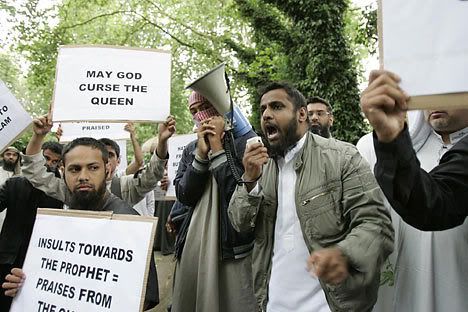
David Cameron today pledged to make Britain ‘a lot less’ tolerant towards Islamic extremists who whip up hatred against the West.
In a major speech on terrorism, the Prime Minister argued that Britain has been too ‘passive’ towards organisations and preachers who poison the minds of young Muslims.
David Cameron and German Chancellor Angela Merkel at the International Conference on Security Policy in Munich today.
'Frankly, we need a lot less of the passive tolerance of recent years and much more active, muscular liberalism,' the Prime Minister said
Signalling a major departure from Labour’s softly-softly approach,
he suggested that to ‘belong’ in Britain, individuals must sign up to core values such as freedom of speech, the rule of law and democracy.
In a barely-concealed attack on the opposition, he will say: ‘It’s time to turn the page on the failed policies of the past.’
The Prime Minister pledged to end all public funding for groups which give succour to extremist views.
 And he called for action to ban extremists from radicalising young people in universities, prisons and internet chat rooms.
And he called for action to ban extremists from radicalising young people in universities, prisons and internet chat rooms.
At a security conference in Munich today, Mr Cameron said: ‘Frankly, we need a lot less of the passive tolerance of recent years and much more active, muscular liberalism.’
His warning comes just days after Britain’s independent reviewer of anti-terrorism laws, Lord Carlile, said that human rights rulings had made Britain a ‘safe haven’ for suspected foreign terrorists.
The Prime Minister also hit out at Labour’s experiment with multiculturalism – calling it a failure.
He says society has failed to provide a strong sense of what it means to be British, making it easier for extremists to prey on youngsters seeking something to identify with.
He added: ‘We have even tolerated these segregated communities behaving in ways that run counter to our values.
‘So when a white person holds objectionable views – racism, for example – we rightly condemn them.
‘But when equally unacceptable views or practices have come from someone who isn’t white, we’ve been too cautious, frankly even fearful, to stand up to them.’
Mr Cameron pledged to end the state funding of groups that help foster extremist views, even if they are not directly linked to terrorism.
He warned that there is a ‘spectrum’ of dangerous groups, ranging from those advocating suicide bomb attacks to those who ‘may reject violence, but who accept various parts of the extremist world view, including real hostility towards western democracy and liberal values’.
He said: ‘As evidence emerges about the backgrounds of those convicted of terrorist offences, it is clear that many of them were initially influenced by what some have called “non-violent extremists” and then took those radical beliefs to the next level by embracing violence.’ Shami Chakrabarti, director of civil liberties and human rights campaign group Liberty, said: 'I don't know how the Prime Minister defines multiculturalism, but I agree with every fundamental right and freedom set out in his speech.
Shami Chakrabarti, director of civil liberties and human rights campaign group Liberty, said: 'I don't know how the Prime Minister defines multiculturalism, but I agree with every fundamental right and freedom set out in his speech.
'These are the values enshrined in the Human Rights Act which I hope he will now promote rather than denigrate.'
Downing Street declined to name the groups Mr Cameron is referring to. But controversial organisations which have received state funding in the past include Hizb-ut-Tahrir and the Muslim Council of Britain.
Mr Cameron warned fellow European leaders that they cannot tackle terrorism simply by tracking down extremists abroad in countries like Afghanistan and Pakistan and must ‘wake up to what is happening in our own countries’.
FOREIGN SECRETARY WARNS OF CYBER WARS
Governments must agree rules for online behaviour to prevent ‘cyber war’ breaking out between states, William Hague warned yesterday.
The Foreign Secretary revealed that as recently as last month his department’s IT system had come under attack from a ‘hostile state intelligence agency’.
He added that reliance on computer networks to control everything from the supply of electricity to the flow of money had ‘opened up new channels for hostile governments to probe our defences’.
Mr Hague told the Munich Security Conference that he was willing to host an international conference in Britain to discuss ‘norms of acceptable behaviour’ in cyberspace.
And he called for ‘real political and diplomatic weight’ to be put behind regulations to prevent an online war.
Sarkozy latest to declare multiculturalism a failure
Holland is the Latest to Admit Failure of Multiculturalism...







No comments:
Post a Comment